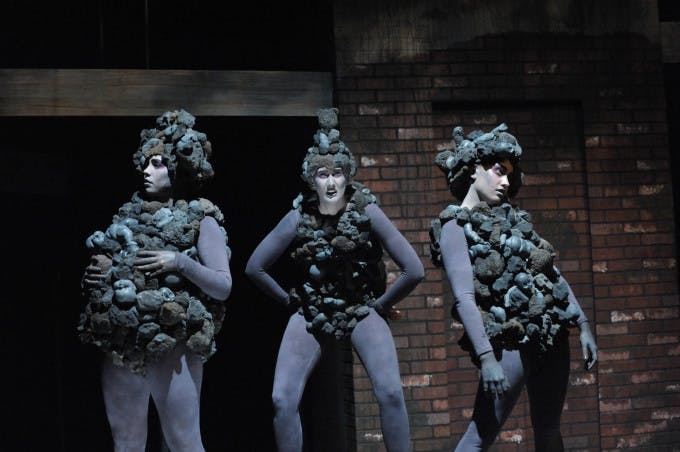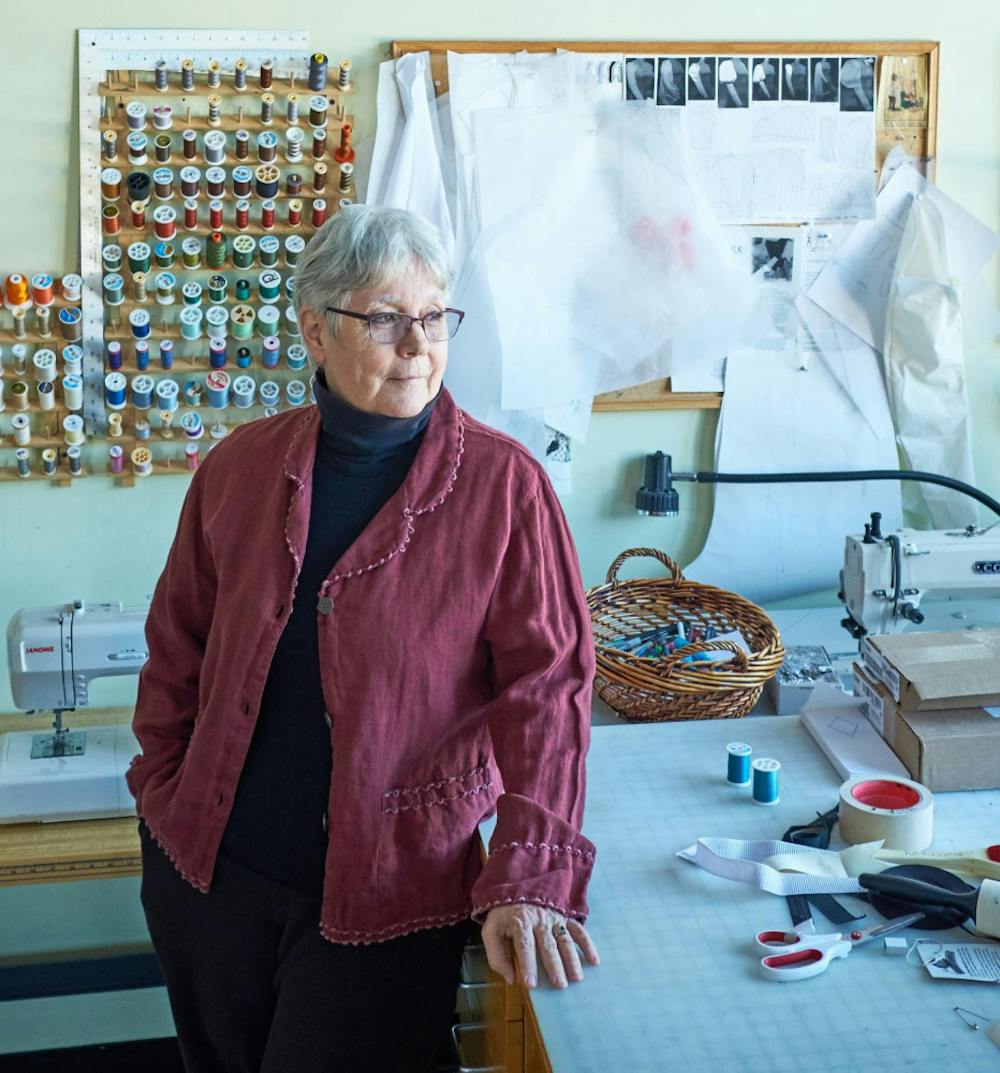Marcia Provoncha has started her work day the same way for 14 years — checking her emails, especially those from students — to keep up with the demands of her role as Middlebury’s Costume Shop director.
Born in Hartford, Connecticut, Provoncha moved to Vermont with her parents when she was three and has lived most of her life here ever since. After learning how to sew in high school, Provoncha went to college for a couple of years, but decided to drop out because of financial reasons. Starting off at a local sewing studio for five years, Provoncha picked up finer sewing skills from the woman she was working for, and was later hired to manage another local weaving and sewing studio, where she stayed for another fifteen years before coming to Middlebury.
When there was a part-time job opening at the college, Provoncha did not feel confident that she would qualify. Despite her concerns about sewing costumes and about not having a higher educational background, Provoncha eventually gave it a try and applied for the job.
“They called me in for an interview and they wanted me to bring in things I had made, so I did, and they looked them all over and everything. Two days later, they called me and offered me the job,” Provoncha said.
Arriving at Middlebury with extensive experience in sewing garments for people, Provoncha discovered a totally different world in making costumes. Rather than a straightforward process of taking measurements, doing a mock-up, making slight adjustments, and then sewing the garment from beginning to end, making costumes is full of complex intricacies.
After completing all of these steps on a costume design, Provoncha has to wait for another round of fitting to make sure that every small piece of a costume is exactly where they should be, i.e. sleeves nicely sitting on the shoulders rather than dangling from a lower spot.
“You put the collar on after that. Closures, buttons, zippers, all that kind of stuff is last. And that’s not always the case when you are making one for someone who is not an actor,” Provoncha explained. “Another difference is that you leave a lot of seam allowances. Because you usually use those garments more than once on more than one actor, you want to make sure you have enough fabric in hand to let that garment out for a bigger person.”
Overseeing four major theater productions every year as well as managing costumes for the annual J-term musicals, providing help for student projects and various shows during summer language schools, supporting anyone from the school who needs costumes, Provoncha has become a walking costume carousel in the past fourteen years.
As someone randomly picks up a costume from thousands of the stock pieces hanging and turning downstairs on a carousel, Provoncha could easily tell you who wore it during what show, and even the size of it.
When asked about her secret, Provoncha said, “If you work on a garment so many times, you won’t forget.”

For the “Eurydice” production in 2011, Provoncha incorporated baby dolls into the costume.
Every time there was a new theater production, it started a brand-new journey for Provoncha. The first show she worked on at Middlebury was “The Bewitched,” which takes place in the 1600s. The show only used period clothing, which involved corsets, bum rolls, great big dresses with huge hands for female characters and very fitted ornate costumes for males.
“That was probably one of my favorite shows. I love sewing period clothes. They are much more interesting than modern clothes,” Provoncha said. “Another one I loved working on for probably the opposite reason was called ‘St. Crispin’s Day.’”
With the story taking place in medieval times, the costumes had to look like medieval garments despite the fact that they were made new and fresh for the show.
“So, you are cutting them out, making them look brand new, and then you have to distress them to make them look like somebody has worn them for fifty years. So, you put holes on them on purpose, and you get them all dirty and ragged looking. [...] They all looked great, and they all looked crappy,” Provoncha said.
Occasionally, there were challenging costumes, and that was when the costume shop became a place of magic that turned the impossible into something that was real and beautiful.
Back in the spring of 2011, the costume designer for the production “Eurydice” had pictured for three of the female characters to be covered in all grey with dead babies or teddy bears.
“I ordered all of these baby dolls from a toy store. Then we sat in the costume shop, took them all apart, taking off the legs, arms, and heads, and we had to spray paint them all,” said Provoncha.
As thick as a baby doll could be, it was a great amount of work for Provoncha and the people working at the costume shop to sew each of the baby dolls onto a fat suit three times.
“They were amazing looking when they were done, but to keep sewing over and over again, trying to push a needle through a rubber baby doll into something else and making sure that it was secure was tough,” said Provoncha.
Stepping into her fourteenth and last year working at Middlebury, Provoncha said working with students was the highlight of her job. Not only the students who work and help out at the costume shop or the sewing studio, but also the ones who come in for fittings or who simply walk in for help in costumes.
Olivia Christie ’19, a theater major from Fairfield, Vermont who started interacting with Provoncha as a student actress during her first semester and then began working at the costume shop two years ago, described Provoncha as “a source of light and joy.”
“She taught me a lot of things to do with sewing, but a lot of her influence comes from just how kind she is,” Christie said. “She really cares about all of the students that come through, and that’s rare to have someone who is so ready and willing to be supportive, help you out, and do you a favor.”
Sophia (Ningxuan) Dong ’21, an IGS major from Ningbo, China, just started to work at the costume shop last fall. Besides feeling the serious and responsible side of Provoncha when working, Dong thought Provoncha more “like a grandmother,” who would listen to anything you say.
“She would give you candies. Sometimes, she treats you like a child. But that’s pretty cool because you just feel like you grow this type of bond with her and you would not be willing to disappoint her,” Dong said.
While looking forward to spending time gardening, visiting her children, and camping and travelling with her husband after retiring in May, Provoncha said the part she would miss the most was working with the students.
“The students keep me young. We listen to music all the time in the shop. That’s how I get to know who the latest bands are and everything. And to teach them something they don’t know how to do, and they are so proud that they have done that. That’s definitely the best part of the job,” Provoncha said.
“I just really enjoyed working with Marcia over the past four years, and I think a lot of people would say the same thing,” Christie said. “She just really cares about her students and about everybody’s well-being, which is really nice in a crazy competitive fast-paced place like Middlebury to have someone who is so there for you on the individual level.”




